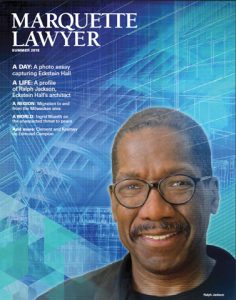Reporter Describes Reporting Behind Story That Sparked the #metoo Movement
Do you think anybody’s going to care?
New York Times reporter Megan Twohey recalled asking that question during a cab ride with her reporting partner, Jodi Kantor, just before a demanding investigative story they had been working on was to appear in print. The two had been told they would never get the story in the paper. The two had been told few would care if it did appear.
During an “On the Issues with Mike Gousha” program at Eckstein Hall on Friday (May 11), Twohey described what led up to printing their story on Hollywood mogul Harvey Weinstein’s record of sexually abusive misconduct. Their first story ran at the top of the Times’ front page in October, 2017.
Other journalists had set out to do publish stories on Weinstein’s long-rumored treatment of women. None had succeeded in getting something published. Women who are victims of such treatment are often reluctant to talk publicly, and that was especially true with Weinstein, who had great power and influence in the entertainment industry. Furthermore, Weinstein had fought strongly against such stories being published. Kantor and Twohey were told he would intimidate the Times into withholding publication.
Twohey said the two realized they had to build a case based on evidence that went beyond he said-she said versions of what happened in specific incidents. They were able to do that using materials such as corporate documents and records of out-of-court settlements. She said the Times set rigorous standards for what could be put in print.
Twohey said that once the story appeared, she and Kantor were so involved in follow-up work, they didn’t pay much attention to the impact in the first few days. But the impact was huge – their work played an important part in sparking the #metoo movement that has made harassment and abuse of women in the work place a national issue. Twohey called it a time of reckoning for those who have been involved in harassing women.
Among other recognitions, Twohey and Kantor have won a Pulitzer Prize and been named to Time magazine’s list of the 100 most influential people in America. They have signed a contract to write a book and an option on movie rights to their story. Twohey was in Milwaukee to be honored by the Milwaukee Press Club at a banquet.
Gousha asked Twohey what it was about the Weinstein story that triggered such strong reactions. Other prominent figures, such as television commentator Bill O’Reilly, already had lost their jobs over similar allegations.
Twohey said a big factor seemed to be that in this case, the perpetrator, as powerful as he was, was not as famous as some of the victims who agreed to speak on the record. Twohey said the fact that such well-known movie figures were willing to say they had been victimized and wanted justice motivated women across the country to speak up about their own experiences.
“The real moral horror (about the Weinstein situation) . . . was that he was able away with this for 40 years,” Twohey said. What she called “the complicity machine” in which Weinstein’s aides, associates, and friends protected him was just as important, she said. She and Kantor did a follow-up story on the systemic failures and assistance that allowed Weinstein to intimidate people into staying silent.
“It was remarkable at every turn what we uncovered,” she said, when it came to the extent of sexual harassment problems in many different settings. Twohey, who has a 14-month-old daughter, said she hopes the revelations reported by the Times and other news organizations will mean her daughter will not find herself years from now in workplaces where there are such problems.
“I think this has been a big teaching moment for families,” Twohey said.
To watch the hour-long conversation, click here.
To watch Gousha’s interview with Twohey on the “Upfront with Mike Gousha” television program, click here.

 Has it been 10 years already? Yes, the tenth anniversary is at hand for the groundbreaking for Eckstein Hall on May 22, 2008.
Has it been 10 years already? Yes, the tenth anniversary is at hand for the groundbreaking for Eckstein Hall on May 22, 2008.